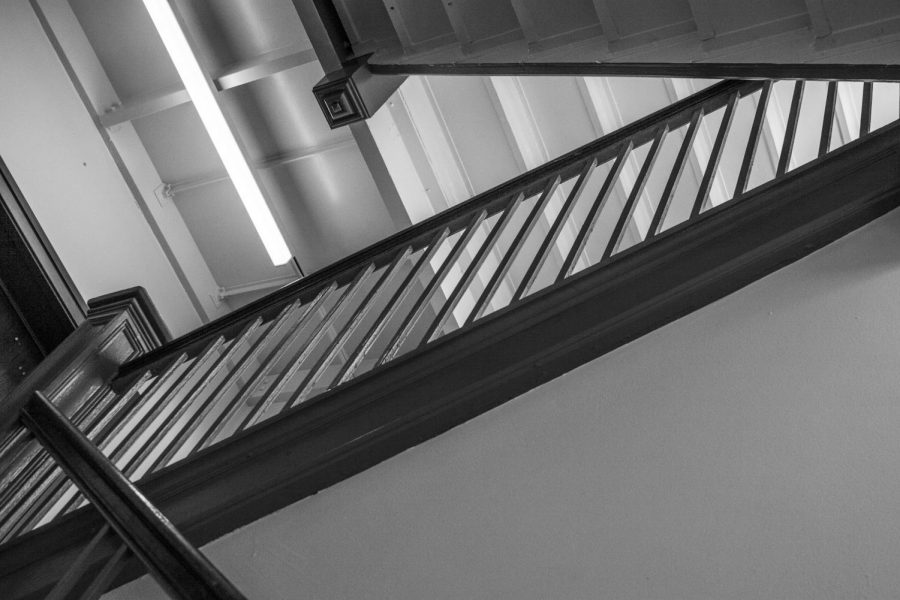Toledo: Stop institutionalizing ableism
A staircase in Mather House. It’s just one of many buildings at CWRU that lack accessibility options for disabled students.
March 29, 2019
There’s this simulation called the Spoon Theory Demonstration. It’s used to help people who aren’t disabled to better understand that tasks that may seem simple to them are significantly more difficult to those of us with chronic illnesses and other disabilities.
You’re given 20 spoons at the very beginning of the simulation, and the number of spoons you’re holding decreases each time you encounter a situation that would pose a serious challenge to a person with a disability or chronic illness; the number of spoons decreases proportionally to the amount of energy needed to carry out a particular task. For example, you’d lose a spoon for getting out of bed in the morning, as such an action can be incredibly taxing to people with limited mobility, physical handicaps or, like in my case, arthritis.
The idea is that, before long, you’d be completely out of spoons just from doing things you do each day without thinking about them.
The goal of the Spoon Theory Demonstration and its variants is to help people without disabilities to understand what we go through every day; maybe if someone can put themselves into our shoes for just a moment, they can understand and empathize a little better. Maybe it’ll change the way they look at everyday actions, making them more aware of their own ability.
The people who designed Case Western Reserve University’s campus clearly never did the Spoon Theory Demonstration. The campus is a logistical nightmare for people with physical disabilities because older buildings like the Flora Mather House have no elevator or equivalent accommodation. In addition, many buildings lack gender-neutral restrooms for LGBTQ+ individuals who might not feel comfortable using multi-stalled gendered bathrooms.
But the sad truth is that Mather House isn’t even the only building with serious accessibility issues. Buildings all across campus, including some of the residential facilities, have limited accommodations for disabled individuals.
Instead of equipping each residential hall with Americans with Disabilities Act (ADA)-accessible rooms and restrooms, the university often offers its disabled students a place in Stephanie Tubbs Jones Residential Hall or the Village at 115. On the one hand, this is great, as both spaces are set aside specifically to accommodate disabled students. On the other hand, if you’re a second-year student, you might be forced to live on the opposite side of campus from your peers to accommodate your disability. All of this, by the way, ignores the eight ominous flights of stairs separating the “Bottom of the Hill” residents of South Residential Village from those at the “Top of the Hill.”
The limited accommodations provided for disabled individuals also don’t take into account issues of intersectionality. For example, in Crawford Hall, there is no bathroom that is both gender neutral and ADA-accessible. This means that if you’re a non-binary individual in a wheelchair, you’re just going to have to find another place to go to the bathroom.
For the sake of argument, let’s add another layer to this hypothetical situation. You’re now a non-binary individual in a wheelchair with a digestive autoimmune condition like ulcerative colitis or Crohn’s disease that makes you have sudden, unstoppable urges to use the restroom. Now, finding another location to use the restroom isn’t an option—you need a restroom, and you need it now.
Sometimes, the university approves special parking passes to students, staff and faculty with limited accessibility. But, to quote the website describing this accessible parking, “even when students are approved for accessible parking, they must purchase a permit through parking in Access Services.” What if you’re a student paying your own way through college and require a car for disability reasons, but can’t afford the exorbitant $61.99 per month for even the cheapest parking pass on campus?
To give credit where it’s due, the university is working to change some of these accessibility issues. For example, Undergraduate Student Government, partnering with organizations like the Social Justice Institute, is working on an initiative to increase the number of single stall gender inclusive restrooms across campus.
But this isn’t enough. The CWRU community need to push harder to make our campus not just accessible to people of varying degrees of ability, but inclusive of them too; there’s a difference between providing these accommodations and standardizing them.
Once providing appropriate disability accommodations in every single building on campus is the norm, CWRU will have truly established itself as supportive of the people who need these facilities.
Katharine (Katie) Toledo is a second-year student from Columbus, Ohio. She studies political science and history on the pre-law track with a minor in Spanish. Her hobbies include watching Netflix, staring at photos of her two beagles, visiting Mitchell’s Homemade Ice Cream and writing for The Observer.



